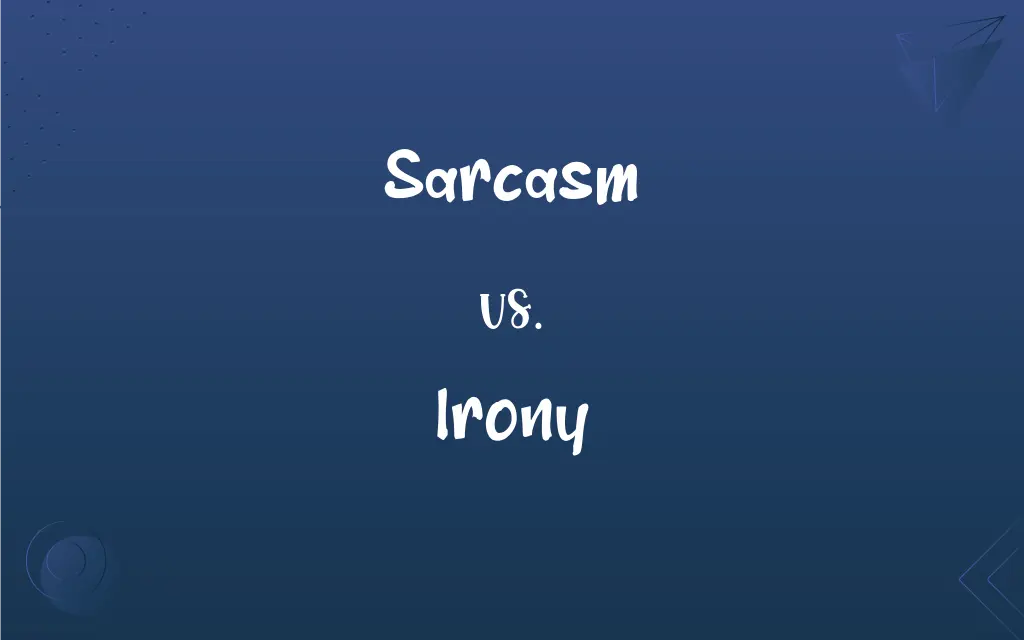Sarcasm vs. Irony: What's the Difference?
Edited by Janet White || By Harlon Moss || Updated on October 20, 2023
Sarcasm is a form of verbal irony expressing mock praise or contempt, while irony conveys a difference between appearance and reality, often unexpectedly.

Key Differences
Sarcasm typically involves making a mocking or contemptuous remark to emphasize its opposite meaning. Irony, in contrast, is a figure of speech wherein the intended meaning differs from the literal meaning of the words used. Both forms of expression highlight contrasts, but they do so in different ways.
Using sarcasm, a speaker might convey contempt or mock someone by saying the opposite of what they mean. For instance, upon seeing someone make an obvious mistake, one might sarcastically comment, "Well, that was smart!" Irony, however, can exist without an intent to mock. For instance, if a professional swimmer drowned in a kiddie pool, it would be seen as ironic because it's the last place you'd expect such an event to occur.
Sarcasm is often delivered in a mocking tone, making it easier to identify. This tone is used to ridicule or mock the object of the sarcasm. Irony, on the other hand, doesn't necessarily employ a specific tone. It's more about the situation or the words creating a twist from what one would typically expect.
In literature and daily conversations, sarcasm and irony can be used for various purposes, from highlighting the absurdity of a situation to offering a critique. While sarcasm is more direct and often aims to mock or deride, irony can be subtle, providing a thoughtful observation about life's incongruities.
The two terms, sarcasm and irony, are often used interchangeably, especially in casual conversations. However, they possess distinct characteristics. While both convey contrasts in meanings, sarcasm is more caustic and directly mocking, whereas irony reveals an unexpected twist or difference between appearance and reality.
ADVERTISEMENT
Comparison Chart
Definition
Mocking statement implying the opposite of what's said.
Expression showing discrepancy between expectation and reality.
Tone
Often mocking or contemptuous.
Neutral or non-mocking, can be subtle.
Intent
To mock, ridicule, or show contempt.
To highlight an incongruity or unexpected outcome.
Delivery
Typically direct and clear.
Often indirect and relies on context.
Usage
More common in spoken language.
Found in both spoken and written forms.
ADVERTISEMENT
Sarcasm and Irony Definitions
Sarcasm
Sarcasm is a form of verbal irony used to mock.
Oh, great! Another flat tire, she said with dripping sarcasm.
Irony
Irony highlights a discrepancy between expectation and outcome.
The irony is that the fire station burned down while the firefighters were at a different location.
Sarcasm
Sarcasm can be a tool of humor or criticism.
Thanks for the help, she said sarcastically, after doing all the work herself.
Irony
Irony conveys a twist between appearance and reality.
The irony of the situation was that the thief's hideout was next to the police station.
Sarcasm
Sarcasm often employs a mocking tone.
Sure, I'd love to work late again, he replied with evident sarcasm.
Irony
Irony can be situational, verbal, or dramatic.
It was a cruel irony that the doctor fell ill during a health convention.
Sarcasm
Sarcasm is a mocking or contemptuous remark.
Nice job on the presentation, he said with heavy sarcasm.
Irony
Irony can be subtle, requiring discernment.
The irony was that he missed the don't be late seminar because he was late.
Sarcasm
Sarcasm involves saying the opposite of one's intended meaning.
You're a real genius, she remarked with sarcasm after he spilled his drink.
Irony
Irony often illuminates life's incongruities.
The irony in the novel was that the hero became what he once despised.
Sarcasm
A cutting, often ironic remark intended to express contempt or ridicule.
Irony
The use of words to express something different from and often opposite to their literal meaning.
FAQs
How is irony defined?
Irony is a figure of speech that conveys a difference between appearance and reality, often resulting in an unexpected twist.
What is sarcasm?
Sarcasm is a form of verbal irony where someone says the opposite of what they mean, often in a mocking tone.
Can irony be unintentional?
Yes, situational irony often occurs without intention, arising from unexpected outcomes.
Why is tone important in delivering sarcasm?
Tone helps convey the mocking or contemptuous intent of sarcasm, making the opposite meaning clear.
How can one identify irony in a statement?
Irony often requires discernment and context, as it highlights a twist or incongruity between appearance and reality.
Is all sarcasm considered irony?
While all sarcasm is a form of verbal irony, not all irony is sarcastic.
Are there different types of irony?
Yes, there are various types of irony, including verbal, situational, and dramatic irony.
Can sarcasm be used without a mocking intent?
While sarcasm typically has a mocking or contemptuous tone, it can sometimes be used playfully without intending harm.
Is sarcasm always hurtful?
While sarcasm can be hurtful, especially if used derisively, it can also be light-hearted or playful.
Is sarcasm a modern form of expression?
No, sarcasm has ancient roots, with examples found in biblical texts and ancient literature.
Is sarcasm more common in speech or writing?
Sarcasm is more prevalent in spoken language due to its reliance on tone, but it can also appear in writing.
How does verbal irony differ from situational irony?
Verbal irony involves saying one thing and meaning another, while situational irony involves an unexpected outcome in a situation.
Can sarcasm be found in literature?
Yes, sarcasm can appear in literature, often to convey a character's attitude or critique a situation.
What is the root word of irony?
"Irony" originates from the Greek word "eirōneia," meaning "dissimulation or feigned ignorance."
Is irony always obvious?
No, irony can be subtle, and its recognition may rely on individual interpretation and context.
Is irony always humorous?
While irony can be humorous, it can also be tragic or simply observational.
How does dramatic irony function in literature?
In dramatic irony, the audience knows something that the characters do not, creating tension or humor.
Can sarcasm be constructive?
Yes, when used judiciously, sarcasm can offer constructive criticism or emphasize a point.
Do all cultures perceive sarcasm in the same way?
No, sarcasm's perception can vary across cultures, and what's sarcastic in one culture might not be in another.
Why do people use sarcasm?
Sarcasm can be used for humor, criticism, or to emphasize a point by stating its opposite.
About Author
Written by
Harlon MossHarlon is a seasoned quality moderator and accomplished content writer for Difference Wiki. An alumnus of the prestigious University of California, he earned his degree in Computer Science. Leveraging his academic background, Harlon brings a meticulous and informed perspective to his work, ensuring content accuracy and excellence.
Edited by
Janet WhiteJanet White has been an esteemed writer and blogger for Difference Wiki. Holding a Master's degree in Science and Medical Journalism from the prestigious Boston University, she has consistently demonstrated her expertise and passion for her field. When she's not immersed in her work, Janet relishes her time exercising, delving into a good book, and cherishing moments with friends and family.































































